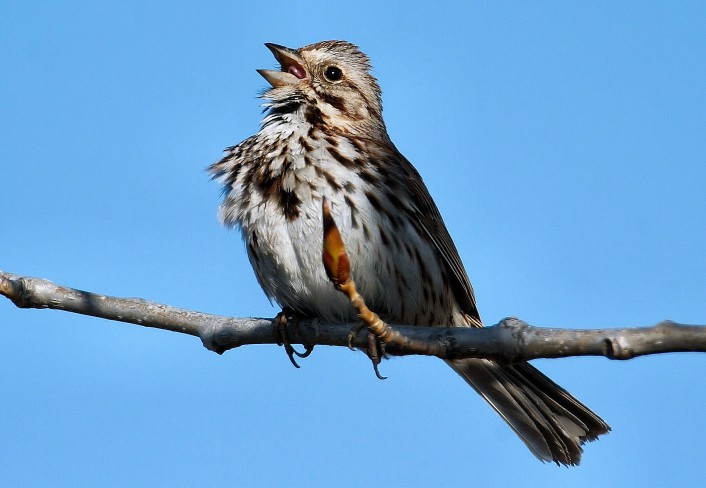Most of us consider the Red-winged blackbird as one of the first harbingers of spring to make its presence felt in our yards.
And that is very true, but there is another bird that is close on the red-wing’s heels, or should I say,” tail”. A bird with one of the most beautiful of songs, and yet is often overlooked as being drab and common—the appropriately named Song Sparrow.
You will most always hear him long before you see him, and when you do, it is quite easy to visually lock on to him. As our property is surrounded by a cedar hedge, he is usually standing on the top branch, erect with head straight up, singing his heart out, and what a glorious song it is. (To hear this melody, check out the Cornell University Lab of Ornithology website at: www.allaboutbirds.org/guide/songsparrow/sounds.)
Song sparrows usually arrive back in our region while there is still snow on the ground. Two individuals arrived at our property on March 22 this year. If you are brave enough to sleep with your bedroom window open just a little, he will serenade you with his song as he cracks the early morning quiet, at first light.
A member of the very large family of Sparrows, often referred to by birders as “little brown jobs” or LBJ’s, Song Sparrows are one of the most widespread bird species having a number of sub species. They nest in most every region of Ontario.
They prefer shrubby habitats which entices them to both urban and rural landscaped yards. Nests of leaves, grass and hair from neighbourhood pets and wildlife are built either on the ground or in shrubs close to the ground in mid April. Four or five brown, spotted eggs are laid and as many as three broods may be raised during the breeding season. Although the females build the nest and take care of incubation, both parents engage in feeding the young with insects. The young will fledge in about two weeks after the eggs hatch.
Although Song Sparrows are easily identified by their songs, they do have different dialects, enabling them to distinguish between individuals from a mile or more away, just as we can distinguish a Newfoundlander or a person from Georgia for instance.
Now that April is here, get that bedroom window open overnight, just a crack.
When you awake, be still for a time and listen…listen to one of the early sounds of spring—the wonderful, melodious Song Sparrow!
David A. Homer is a volunteer and board member for The Couchiching Conservancy, which currently helps protect more than 11,000 acres of special natural land in the region.
Photo courtesy of Larry Kirtley.

